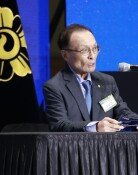Will gov’t do nothing for 10 million senior citizens who want to work?
Will gov’t do nothing for 10 million senior citizens who want to work?
Posted July. 28, 2021 07:45,
Updated July. 28, 2021 07:45
The number of senior citizens who want to keep working in the future exceeded 10 million for the first time in South Korea. According to the survey by Statistics Korea, 68 percent of 14.76 million senior citizens aged between 55 and 79 said they want to continue to work in the future, which is 430,000 more than the year before. On average, they want to work until the age of 73, but unfortunately, half of the senior citizens are unemployed and even those working tend to hold a simple labor job or a public-offered temporary position. Measures to prevent their fall into poverty and utilize their manpower are urgent.
The average year that people stop working was 49.3, which means that a lot of South Koreans lose their jobs before 50 and are forced into low-wage jobs. Six out of 10 senior citizens cited financial difficulties as a reason to work. Unless their job issues are addressed, South Korea’s dishonorable record of the highest poverty rate among senior citizens as an OECD country will stay for a long time.
One out of three South Koreans aged over 15 are senior and this share is growing larger. If senior citizens are left unemployed while the country’s population is declining, it will lead to a labor shortage and a growth slowdown. While the employment rate among senior citizens currently stands at 56 percent, which is the highest figure since 2005 when the relevant statistics began to be collected, the quality of their employment is poor. About 70 percent of employed senior citizens work in the low value-added public sector, agriculture/forestry/fishery, wholesale/retail, and accommodation/food businesses. Policy support to utilize their expertise or retrain them to work in high value-added sectors is required.
The labor sector is arguing for extending the retirement age. However, it will increase the burden on companies and worsen unemployment among younger people. According to the Korea Employers Federation, extending the retirement age to 65 would increase companies’ cost burden by 14 trillion won per year. Experts say that increasing labor flexibility is the priority. The current wage system based on seniority and a rigid employment structure need to be transformed to allow longer employment.
The government, which is running a task force on population policy, confirmed at the beginning of this month that the “continuous employment of senior citizens” is not on agenda. The announcement seems to be in consideration of potential opposition from younger people. Meanwhile, senior citizens are falling into poverty and the working-age population is decreasing. The government needs to increase employment flexibility to ensure that there is no conflict between younger and older workers and introduce retraining or retirement age extension measures to build a more sound labor environment for senior citizens.



![이란 ‘정부 위 정부’ 혁명수비대…무자비 진압-신정체제 최후 보루[글로벌포커스]](https://dimg.donga.com/c/138/175/90/1/wps/NEWS/IMAGE/2026/01/23/133221370.1.jpg)
![“탬버린 흔들며 떼창” 캐리어 끌고 ‘K-노래방’ 직행한 외국인들 [트렌디깅]](https://dimg.donga.com/c/138/175/90/1/wps/NEWS/IMAGE/2026/01/23/133218393.3.png)

![8년전 한밤 중 목욕탕에 나타난 김정은, 분노한 이유는 [주성하의 ‘北토크’]](https://dimg.donga.com/c/138/175/90/1/wps/NEWS/IMAGE/2026/01/23/133210584.1.jpg)
